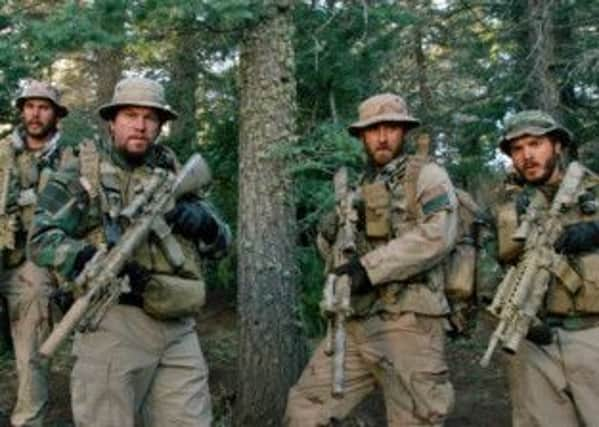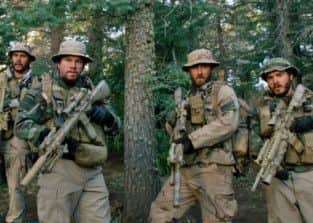Film reviews: Lone Survivor | The Armstrong Lie


Lone Survivor (15) Directed by: Peter Berg
Starring: Mark Wahlberg, Ben Foster, Taylor Kitsch, Emile Hirsche, Eric Bana Rating: * * *
Both the title and Mark Wahlberg’s name above it means there’s no way to discuss Lone Survivor without giving away the ending of this inspired-by-true-events combat movie. Revolving around a company of Navy SEALS who get pinned down on an Afghan mountainside after a mission to take out a high-ranking Taliban operative is compromised, the 2005-set film never bothers pretending that the soldiers accompanying Wahberg’s Marcus Luttrell (upon whose memoir the film is based) are going to be OK.


Advertisement
Hide AdBeyond imbuing every pre-mission exchange with a loved one with a sense of dread, their doomed-from-the-off status allows writer/director Peter Berg to concentrate on delivering a brutal military procedural, one that documents their demise in forensic detail in order to highlight the hellish confusion of war rather than simply celebrating the noble heroism of those fighting it.
It’s important to keep this in mind, particularly since the film is not afraid to drape itself in Stars-and-Stripes jingoism. The opening montage of real Navy SEALS being put through their boot camp paces, for instance, feels like a recruitment ad for masochistic adrenalin junkies, something not exactly diminished by subsequent scenes in which these “brothers” – now played by a cast of youngish movie stars – are frequently filmed against majestic sunrises over Bagram Airbase (where they’ve been stationed). But while Berg’s last movie was the reprehensibly idiotic Battleship, his film version and subsequent television adaptation of the American football saga, Friday Night Lights, have shown him to be a flag-waver capable of real depth, and in Lone Survivor he at least makes some effort to grapple with the ethics and morality of modern warfare.
That happens in the film’s pivotal scene. Stuck on a mountainside with failing communications equipment and visual on their target, Luttrell and his small team of fellow “frogmen” – Michael Murphy (Taylor Kitsch), Axe Axelson (Ben Foster) and Danny Dietz (Emile Hirsch) – come across a goatherder and two children. This civilian presence quickly throws an almighty spanner in the works of their mission. Are they affiliated with the Taliban or not? Should they risk letting them go, or should they tie them up and risk three innocent civilians perishing from exposure? Or should they simply – as one member of the team puts it – “terminate the complication” themselves?
It’s an effective and brilliantly executed scene, a quiet moment, but one full of high drama thanks to the way Berg and his cast work hard to depict men under incredible duress responding in plausible ways to a situation in which every option they have has the potential to affect their lives in terrible ways. Indeed, Berg capitalises on the eventual outcome of the film being known to wring every bit of sickening tension out of the exchange: whatever decision they make, we know it’s going to result in three of these four young men dying.
The remainder of the film is largely dedicated to depicting how that happens, with Berg unleashing a visceral, in-the-moment play-by-play of a military operation going spectacularly wrong. As a firefight erupts, the team of four find themselves isolated and with nowhere to go but down some impossibly rocky terrain. Here, Berg keeps his camera close, following them as they repeatedly tumble down the mountain: their already bullet-riddled bodies bouncing off boulders with wince-inducing thuds, their faces increasingly covered in gaping wounds. It’s harrowing stuff, a cinematic endurance test designed to catalogue the kind of combat carnage the human body can withstand before it has to give up.
Where the film loses some of its power, sadly, is in its attempts to weave in a botched rescue attempt and address the complexities of local attitudes to the Taliban. There’s not really enough time in the film – or really much inclination on Berg’s part – to provide the kind of political or historical context that would explain such things and, as a result, they feel like unsatisfying plot additions. (A final act encounter between Luttrell and some benevolent Afghan villagers does, however, provide the sort of surreal moment of levity that only war films seem to be able to get away with when a plea for a knife is mistaken as request for a duck.)
Advertisement
Hide AdThere’s also an extended and distracting coda that pays tribute to every Navy SEAL that lost their life on the mission. Berg’s impulse to acknowledge each fallen soldier is understandable, but because the film has been told from such a narrow point of view (and is all the more effective because of it), it proves a little distracting.
Still, for its middle section, Lone Survivor is an effective addition to the war-is-hell combat moviesubgenre – one that may not have much to say about why wars are fought, but has plenty to say on how they’re fought.
The Armstrong Lie (15)
Directed by: Alex Gibney
Rating: * * *
Advertisement
Hide AdHaving made searing films about the scandal-plagued likes of Julian Assange (We Steal Secrets), New York City mayor Eliot Spitzer (Client 9) and Enron executives Ken Lay and Jeff Skillin (Enron: The Smartest Guys in the Room), Alex Gibney has acquired a reputation for providing clear-eyed analysis of complex events and the blinded-by-hubris figures at their centre.
This should make him the ideal person to investigate disgraced cyclist Lance Armstrong, but having embarked on a film about him while Armstrong was making his 2009 comeback, Gibney got too caught up in the Armstrong mythos and missed the real story. Forced to abandon the film, he returned to the project after Armstrong admitted to Oprah Winfrey that he had used performance-enhancing drugs for much of his career.
As a result, this second stab at the Armstrong story has a strong mea culpa feel to it. Gibney frequently writes himself into the film as one of the many duped by its subject and even uses his own credulity in 2009 as proof of Armstrong’s extraordinary gift for self-mythology. If that makes some of the arguments contained within The Armstrong Lie feel a little tenuous at times (as footage of various press conferences shows, there were a few journalists who weren’t taken in by him), it doesn’t render the film a failure.
On the contrary, it provides a useful overview of Armstrong’s career, one that chronicles the way in which he eventually hoisted himself with his own petard. As the persistent doping rumours intensified his determination to live his life according to his own against-the-odds narrative (emerging from a broken home, defeating cancer, winning the Tour de France seven times), his extraordinary feats of physical endurance in turn intensified the doping rumours.
Consequently, it’s now clear that his 2009 comeback was an act of folly, but it’s telling that he says in the film that his biggest regret was letting the lie get too big and out of hand – as opposed to, say, getting involved with doping in the first place.
As Armstrong sees it, cycling was so rigged he had to dope to compete: what’s ultimately fascinating about The Armstrong Lie is his unwillingness to let go of this justification. Even in the light of the Oprah confession – which wasn’t exactly filled with contrition – he goes to extraordinary linguistic lengths with Gibney to avoid accepting the truth. In the future, he reckons, history might judge him to be the champion he still believes he is. Gibney – determined not to be taken in again – calls him what he is: a cheat.
Out of the Furnace (15)
Directed by: Scott Cooper
Advertisement
Hide AdStarring: Christian Bale, Casey Affleck, Woody Harrelson, Zoe Saldana
Rating: * * *
Writer/director Scott Cooper follows up Crazy Heart with this hard-hitting war-at-home drama about an ex-con (Christian Bale) investigating the disappearance of his troubled Iraq war veteran brother (Casey Affleck). Set against the backdrop of the economic downturn in a dying steel town where opportunities are few, the film offers an earnest treatise on the harsh prospects facing ordinary Americans wrapped up in the guise of a revenge thriller. And as long as one doesn’t make the mistake of going purely for genre thrills – it’s really just the necessary dressing for a more character-driven film – there’s much to appreciate here, not least Bale’s muted performance as a decent, hard-working guy plagued by bad luck, but not yet beaten by it.
Advertisement
Hide AdPlaying against type, he’s the least volatile character here and he anchors both Affleck’s turn as his resentful, battle-scarred younger brother and Woody Harrelson’s malevolent presence as a psychotic hillbilly, whose illegal fight clubs Affleck finds himself drifting towards. Though the film constantly teeters on the brink of melodrama, Cooper never lets his cast boil over or the story get away from him.
The Missing Picture (12A)
Directed by: Rithy Panh
Rating: * * * *
Cambodian filmmaker Rithy Panh uses an intriguing mix of archival footage and clay figurines to recreate his traumatic childhood under Pol Pot in this experimental cinematic essay. A survivor of the Khmer Rouge, he documents his country’s troubled history by positioning the figurines in haunting tableaux, then recounting in detail the story of his family’s systematic
destruction in Cambodia’s rural labour camps.
The juxtaposition of these static arrangements with his narration is disturbing and moving, and the effect of this technique is intensified as he starts intercutting these images with propaganda films from the period to show how distorted the truth became. Though very different in style, the film is reminiscent of The Act of Killing and Nostalgia for the Light in terms of its effect – and is further proof that taking an innovative approach to history is a good way of unlocking its secrets.
That Awkward Moment (15)
Directed by: Tom Gormican
Starring: Zac Efron, Miles Teller, Imogen Poots, Michael B Jordan
Rating: * *
Proving that Judd Apatow-style relationship comedies are trickier to pull off than their loose, free-wheeling style suggests, That Awkward Moment struggles to reconcile its Apatow-inspired desire to be simultaneously vulgar and sincere while exploring the vicissitudes of the dating scene for guys in their 20s.
Zac Efron and Miles Teller star as best friends who make a pact to stay single after the marriage of another friend (played by Michael B Jordan) falls apart. For these guys, the casual hook-up is king and Viagra is consumed to permit excessive drinking without diminishing sexual performance.
Advertisement
Hide AdIncredibly, beautiful young women seem to find this behaviour so delightful that these largely hateful characters are not only able to keep a roster of girls in constant rotation, they can even score dates with women after mistaking them for hookers. Even worse, by allowing the guys off the hook so quickly at the end, the women in the film can’t help but seem like submissive dolts.